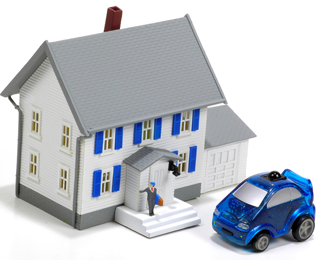Did you buy a new car lately? Perhaps you moved into a new home. Or maybe you decided to purchase a boat or a recreation vehicle. This blog will discuss why you need to talk to your insurance agent about these important changes.

Autos
Auto coverage for a new or replacement auto can vary. A new car is one you bought in addition to the cars you already own. A replacement car is just that: one you replaced for a vehicle you previously owned.
What coverage you have can depend on whether the car is a new car or a replacement car. It can also depend on what coverage your company provides. Regardless, you need to make the changes to your auto policy within a specified period of time in order for coverage to apply.
The wording in your policy determines what coverage, if any, is automatic and when you need to report the change. Do you have Liability coverage only? Do you need to carry Collision and Other Than Collision coverages on your new auto? Is your car financed through a bank? What coverage do they require? When you talk to your agent, you’ll need to know this information, along with the details of your new car – year, make, model, and serial number. It’s in your best interest to call your agent right away to make any of these changes to your policy. Don’t rely on your car dealer or banker to make changes for you.
Homes
Your homeowner’s policy covers only the dwelling shown on your policy’s declaration page. A new or a replacement home isn’t automatically covered so you must contact your agent with all the required information about your new home, such as:
- What is the location/address of your new home?
- What year was the home built?
- Who’s the responding fire department?
- Have any updates been made to the home: roof, furnace, electric?
- Does the home have a wood stove?
Once your agent has all the necessary information, he/she should be able to bind coverage for you – either verbally or in writing.
Recreation vehicles
Your homeowner’s policy may also provide you with some limited watercraft coverage like Liability coverage for outboards under 50 horsepower or up to $1,500 physical damage coverage. Your homeowner’s policy may also offer some limited Liability coverage for a snowmobile or four-wheeler, but if you drive such a vehicle on the road or a trail, you’ll need to add more coverage. You don’t have automatic coverage for motorized vehicles.
The bottom line is that you should consult with your insurance agent immediately or very soon after you purchase a new vehicle, home, or recreation vehicle in order to be sure you’re properly protected.
This article is intended for general educational and illustrative purposes only and should not be construed to communicate legal or professional advice. Further, this article is not an offer to sell insurance. Please consult with your licensed insurance agent for specific coverage details and your insurance eligibility. All policies are subject to the terms, conditions, limitations, definitions, and exclusions contained therein.





